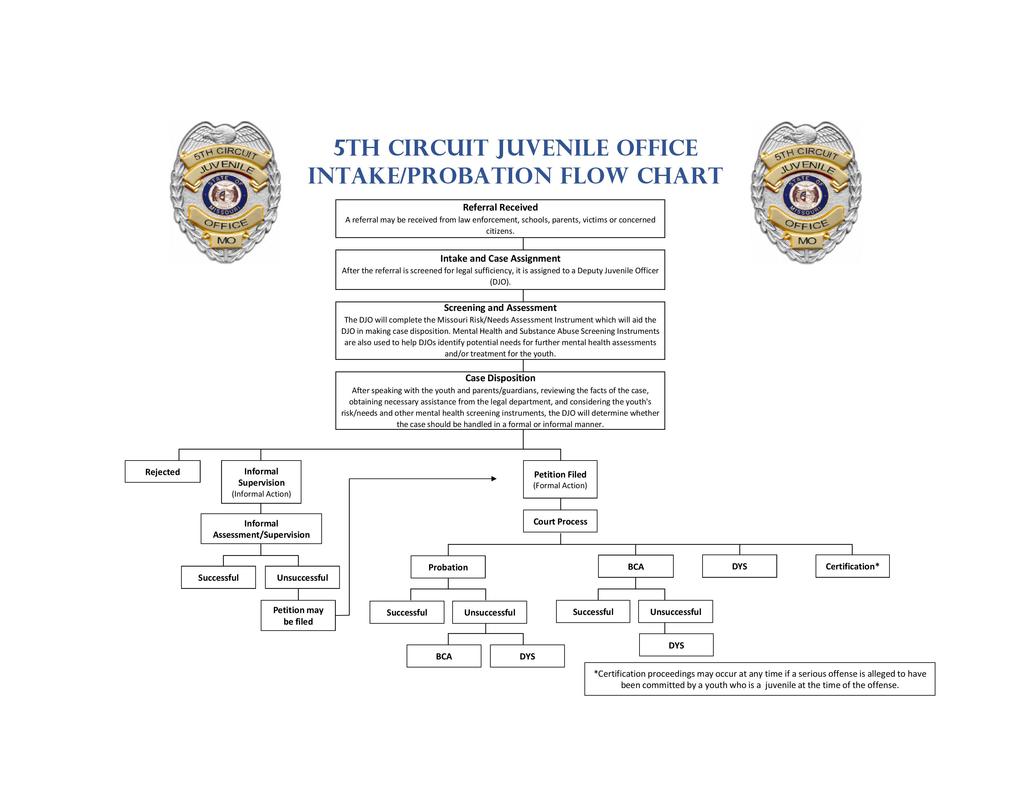Field Services Unit
Deputy Juvenile Officers (DJOs) assigned to new cases are responsible for conducting conferences with a youth and a parent/guardian for all legally sufficient status and delinquency referrals for youth who are not already on either informal or formal probation. The DJO is responsible for gathering background information regarding the youth, identifying strengths of the youth and determining whether the referral will be handled informally or formally. The DJO considers the severity of the offense, the impact of the offense on the victim and community, the juvenile’s referral history, and whether there is any restitution due to the victim. It is vitally important for youth and parents/guardians to cooperate with the DJO to ensure the youth's needs can be met. Status offenders require commitment from the parent/guardian in order to best effect positive change for the youth. The youth’s parent/guardian is an integral part of the probation process. Using a strengths-based approach, the DJO develops an individualized case plan setting forth goals and objectives. Through this process, the DJO may refer a youth to community-based services and programs to help the youth. DJOs utilize evidence-based programs to assist youth with behavioral modification. A critical component to a youth’s success on probation is the youth and family being up front about identifying needs of the youth. It is also imperative that the youth’s family supports positive behavioral changes. DJOs utilize incentives and sanctions in the probation programming process. In the event a youth is not successful while remaining in the community on probation, the DJOs will schedule a systems of care meeting. The youth, the youth's parent(s)/guardian(s), juvenile office personnel, and service providers may be invited to participate in the meeting. The purpose of the meeting is to formulate a recommendation for the Juvenile Court Judge as another attempt to effectuate positive behavioral change. The youth should develop his/her own plan to present at this meeting.
In the event a DJO recommends formal intervention, the officer will make a recommendation as to whether the youth should be placed on probation, be committed to out-of-home placement, or certified to stand trial as an adult.
Out-of-home placement recommendations may include a commitment to the Buchanan County Academy or a commitment to the Missouri Division of Youth Services. The DJO, through legal counsel, makes a recommendation to the Juvenile Court Judge. If a youth is committed to the Buchanan County Academy, the DJO will continue case management. In the event a youth is committed to the Missouri Division of Youth Services, the juvenile court no longer has jurisdiction, and the DJO will no longer be involved in the youth's case.
In the event a DJO recommends formal intervention, the officer will make a recommendation as to whether the youth should be placed on probation, be committed to out-of-home placement, or certified to stand trial as an adult.
Out-of-home placement recommendations may include a commitment to the Buchanan County Academy or a commitment to the Missouri Division of Youth Services. The DJO, through legal counsel, makes a recommendation to the Juvenile Court Judge. If a youth is committed to the Buchanan County Academy, the DJO will continue case management. In the event a youth is committed to the Missouri Division of Youth Services, the juvenile court no longer has jurisdiction, and the DJO will no longer be involved in the youth's case.
For the definition of "certification" please refer to the Glossary Page of this website.


